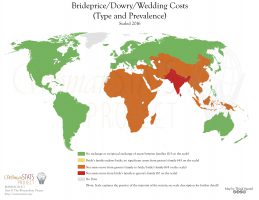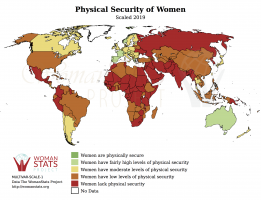Six Negative Effects of the Systematic Subordination of Women

“In The First Political Order, Hudson and her collaborators make the case that the subordination of women is irrefutably tied to the well-being of a nation. Skeptical? The hard data is here, drawn from an exhaustive survey of 176 countries in the WomanStats project. This is the definitive work that ends the debate about the consequences of gender inequality.”
~Ryan Crocker, former U.S. ambassador to Afghanistan
Yesterday, Donna Lee Bowen, co-author with Perpetua Lynne Nielsen and Valerie M. Hudson of The First Political Order: How Sex Shapes Governance and National Security Worldwide, defined and explained the Syndrome and how it develops. Today, Bowen shares 6 findings among the Syndrome’s negative effects.
Enter our drawing for a chance to win a copy of this work to learn more about the Syndrome.
• • • • • •
1. Women are not safe in any place in the world.
Phumzile Mlambo-Ngcuka, executive director of UNWomen, has stated, “Violence is the biggest challenge facing women around the world.”
One of the most discouraging results of our research at WomanStats.org is that women are safe in no country in the world. This finding holds steady year after year. We have documented not only that are women beset by violence wherever they are but also that levels of women’s physical security have consistently declined to the present. It is actually more dangerous for women in most countries now than a few years ago. Take a look at the map of Physical Security of Women scaled in 2019 at, and then compare it to earlier years scaled. The data graphically demonstrate that violence against women is regarded as ordinary and deserved and thus is sanctioned in most societies. Levels of domestic violence, rape, sexual abuse, and murder of women (femicide) are high and remain high. The maps illustrate that Syndrome countries score worse, but non-syndrome countries score poorly. No country is exempt.
The criminologist and gender scholar Hilde Jakobsen studied wife beating in Tanzania and learned that “violence constitutes social order, making and reproducing structures of inequality, [aided by] discourses that authorize violence.” While violence against women is generally higher in Syndrome states, providing physical security for women is a challenge worldwide.
2. If you subordinate women, your country will be less democratic and more violent.
When the Syndrome is encoded in a country, one of the first casualties is any kind of free and competitive government. Free elections fall prey to elite interests, and dictators use corruption and cults of personality to consolidate their position. We tested twenty-two measures of political instability and phenomena that undermine representative government and rule of law. The most significant predictor of autocratic and instable governance was women’s disempowerment in the household. A country that highly encodes the Syndrome is more likely to have a less effective government. In fact, for every one-point increase in the Syndrome scale, the chance of having a less effective government increases 3.53 times (e.g., moving from 8 to 9 on the Syndrome Scale, where higher is worse). A less effective government is characterized as being more autocratic, less representative, less stable, and more corrupt.
One of our strongest and most meaningful correlations was with the highly respected State Fragility Index published by the Fund for Peace. What does state fragility mean? Fragile states are more likely to experience escalating violence and instability, flight of citizens to other countries, public health failures, economic collapse, and significant criminality. Their governments tend to autocracy, often with rebel groups besieging the country’s leadership. State institutions (such as courts, legislatures, bureaucracies) are highly fragmented on ethnic, geographic, or ideological lines, and groups cannot agree on legitimate leadership. National infrastructure is limited and damaged; public services are inadequate; and human rights are ignored in practice. For every one-point increase in the Syndrome scale, the chance that the country will experience greater fragility increases by 2.13 times.
The strong association between the Patrilineal/Fraternal Syndrome and the Fragile State Index indicates conclusively that the status of women is linked to the fate of nations.
3. If you subordinate women, your country will be poorer, less productive, and less developed.
It seems a stretch to predict national economic performance from studying the subordination of women in households. Our study proves that there is a strong connection between countries that highly encode the Syndrome and national economic performance. We analyzed twenty-two measures of economic performance, and again we found that women’s household disempowerment was the most significant predictor. The areas most affected were food security, lack of prosperity, GDP per capita PPP, measures of poverty and economic decline, and factors bearing on economic freedom, global competitiveness, and property rights. In addition, the Syndrome compromised a number of infrastructure measures as well: quality of electricity supply, internet connectivity, availability of affordable housing, and mobile telephone subscriptions. Every one-point gain in the Syndrome scale increases the chance of poverty and economic decline 1.40 times.
The gold standard for development assessment has been the United Nations Human Development Index (HDI), an annual study assessing the well-being of countries worldwide. It measures three vital dimensions: life expectancy, education levels, and economic well-being. Experts generally consider these three dimensions as shorthand for a country’s development.
Our research demonstrated that there is a very high negative correlation between the Patrilineal/Fraternal Syndrome and the HDI (279). HDI measures well-being at the national level, and the Syndrome measures practices that compromise human security. While it may seem intuitive that the two correlate strongly and negatively, we believe that the Syndrome analysis has important implications for development planning. Indeed, our empirical analysis in Health, Education, and Economic Dimensions (see chapter 7) bears this out. We question whether the factors measured in the HDI are foundational or secondary to practices that subordinate women in the household.
4. If you subordinate women, your country will have a poor and compromised environment.
Our research predicts that societies that subordinate and exploit women also are likely to subordinate and exploit Mother Earth. Again, it seems far-fetched to propose that women’s subordination in marriage and in the household affects a country’s environmental practices. Yet in our analysis of eleven measures of environmental protection, the Patrilineal/Fraternal Syndrome proves the most significant predictor. For example, every one point gain in the Syndrome scale gives countries 1.55 times the chance of less water security and poorer environmental quality. Syndrome countries have less safe water, lower air quality, lower levels of environment protection, and less wastewater treatment. More deaths are attributable to pollution; greenhouse gas emissions are higher; and biodiversity declines. Countries that care more for their women also take better care of their environment.
5. Links exist between marriage and terrorism.
Bride price is a practice where the groom’s family pays the family of the bride for the privilege of marriage. Our data indicate that there is a strong correlation between Patrilineal/Fraternal Syndrome states and states that practice bride price and dowry (with dowry, the bride’s family pays the groom’s family for the privilege of marriage, as in Hindu families in India). Look at the map of Bride Price / Dowry / Wedding Costs and you will notice that the countries that follow the practice not only score high on the Syndrome but also correlate with many of the world’s most fragile states. Indeed, we believe that the practice of bride price and dowry are a proxy for high Syndrome scores.

Bride price has risen over time in most areas, and bride price amounts can escalate dramatically and suddenly. In South Sudan, over the span of a few years, bride price went up almost 1000 percent. When families cannot afford the current going price, this denies young men the chance to marry and start a family. The former king Abdullah of Saudi Arabia poured billions of dollars into a development fund to help his subjects pay for wedding costs and buy houses, allowing young men to afford marriage. Terrorist groups, for example Boko Haram and ISIS, also recognize the importance of channeling funds into bride price and marriage-cost subsidies to recruit unmarried fighters seeking brides. The recorded confession of one of the Lashkar-e-Taiba terrorists who stormed the luxury hotels of Mumbai, India, gives rare insight into these phenomena. The young man’s father pushed him to join the terrorist group so that he and his siblings would be able to marry. Lashkar-e-Taiba deposited promised money in the father’s account after the successful attack. Rather than fighting for ideological jihad, the young man was forced into terrorism to finance family weddings.
Millennia of use has deeply embedded the custom of bride price and dowry in many cultures, making it impossible to abolish. It also serves a purpose in cultures that do not pay alimony to wives following divorces. While different practices exist in different areas, judges may require that a portion of the bride price be reserved to pay the bride or her family in case of divorce. In poorer families, the bride’s father may have commandeered the entire amount for his use (and possibly to pay a bride price for a younger brother), which leaves the divorced wife with few resources. States can best control bride price escalation by setting ceilings for bride price, dowry, and even marriage costs.
6. We cannot blame religion for women’s subordination.
Many world religions share an unfortunate history of empowering men and subordinating women. When we began our research a number of years ago, we questioned to what extent the Patrilineal/Fraternal Syndrome relied on religious tenets and practices. Samuel Huntington in “Clash of Civilizations” (1993), presented the controversial theory that some world civilizations (many representing religious communities such as Muslims, Hindus, Buddhists, and Orthodox Christianity) were more prone to instability than others were. We determined that we could not ignore this hypothesis and set out to test it as a cause for practices in the family that disempower women. After much work, our analysis showed that religion could not be blamed for women’s subordination. Rather, practices that support women’s subordination in kinship relations seem to be the decisive factors.
Civilization, our control variable, and the Syndrome show little to no relationship. We hold that this is because the Syndrome crosses cultural, geographic, and national borders. No civilizations hold monopolies on disempowerment of women. When we examine single variables where Civilization showed significance, the outcomes are mixed. A fun fact: Muslim Civilization correlates positively with the Happiness Index and Formal Commitment to CEDAW (the Convention to Eliminate all forms of Discrimination Against Women).
In sum, Civilization shows no correlation with the Syndrome. We believe that Syndrome and Civilization are conceptually different; that is, at one point in our collective histories, all civilizations embodied the Syndrome. One could find Syndrome components in any geographic area or civilization. Areas such as northwest Europe began outgrowing their Syndrome characteristics some hundreds of years ago by developing patterns of marriage and family organization, such as later marriage ages for brides, abolition of polygyny, allowing women inheritance rights, and raising the status of the wife in the nuclear family. Some areas, such as Latin America, have seen huge strides in the last century as a push for democratization and human rights became a key part of their politics and citizens agitated for reforms. Urbanization has been a decisive factor in pushing change in Syndrome practices in some areas but not in others. We see other countries, such as the Philippines, making crucial changes, and we believe these countries possibly to be in transition between the Syndrome and non-Syndrome status. Since our analysis indicates that change in Syndrome status can take place, we have hope that the vicious circle of Syndrome practices can be broken.
Explore more from our feature of The First Political Order and stay tuned on the blog for more from our celebration of Women’s History Month.








